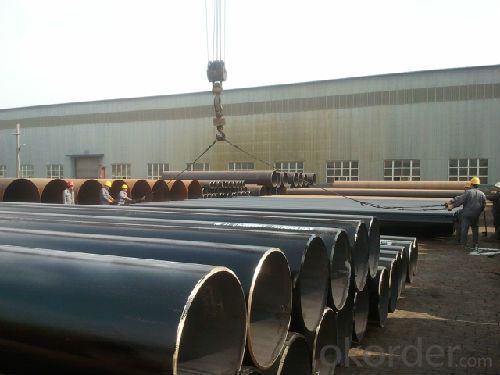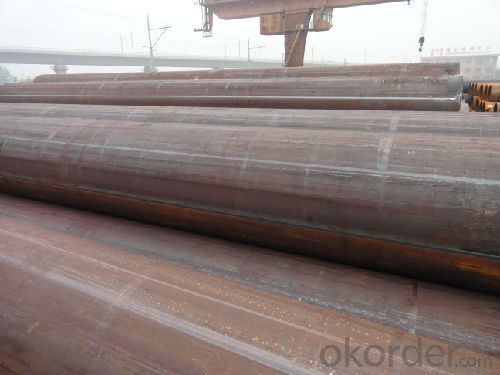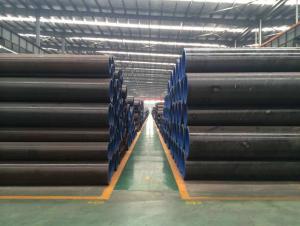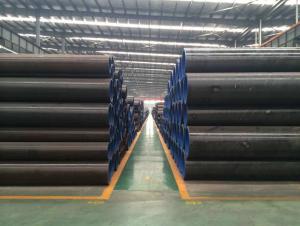Large diameter longitudinal submerged arc welded pipe materials
- Loading Port:
- Tianjin
- Payment Terms:
- TT or LC
- Min Order Qty:
- 28 m.t.
- Supply Capability:
- 9000 m.t./month
OKorder Service Pledge
OKorder Financial Service
You Might Also Like
Product Description:
1、Structure of Welded Steel Tube:
Welded Steel Tube is formed by drawing a solid billet over a piercing rod to create the hollow shell. We are company that have many years experience and professional manager team and engineer team and sales team, sure we will provide you high quality of welded pipe and professioanl service.
2、Main Features of the Welded Steel Tube:
• High manufacturing accuracy
• The higher strength
• The small inertia resistance
• Strong heat dissipation ability
• Good visual effect
• Satisfy price
3、Welded Steel Tube Specification:
Standard | GB, DIN, ASTM ASTM A106-2006, ASTM A53-2007 |
Grade | 10#-45#, 16Mn 10#, 20#, 45#, 16Mn |
Thickness | 8 - 33 mm |
Section Shape | Round |
Outer Diameter | 133 - 219 mm |
Place of Origin | Shandong, China (Mainland) |
Secondary Or Not | Non-secondary |
Application | Hydraulic Pipe |
Technique | Cold Drawn |
Certification | API |
Surface Treatment | factory state or painted black |
Special Pipe | API Pipe |
Alloy Or Not | Non-alloy |
Length | 5-12M |
Outer Diameter | 21.3-610mm |
Grade | 20#, 45#, Q345, API J55, API K55, API L80, API N80, API P110, A53B |
Standard | ASME, ASTM |
1) Material:20#(ASTM A 106/A53 GRB.API5LGRB,GB),45#,16Mn,10#.
2) Specification range:OD:21.3-610mm,WT:6-70mm,length:6-12m or according to the requirement of clients.
3) Excutive standards:GB,ASME API5L.ASTM A 106/A53,Despite of the above standards,we can also supply seamless steel pipe with standard of DIN,JIS,and so on,and also develop new products according to the requirements of our clients!
4) Surface:black lacquered,varnish coating or galvanized.
5) Ends:Beveled or square cut,plastic capped,painted.
6) Packing:bundles wrapped with strong steel strip,seaworthy packing.
4、Packaging & Delivery
Packaging Details: | seaworthy package,bundles wrapped with strong steel strip |
Delivery Detail: | 15-30days after received 30%TT |
5、FAQ of Welded Steel Tube:
①How is the quality of your products?
We have many years business experience in this area, and we have professional engineer and manager team and sure we can provide you high quality production and professional service.
②How about price?
If you like bargain and factory price is not low enough as you think, just don’t waste your time.Please trust the quotation we would give you, it is professional one.
③Why should you chose us?
We can give you both.Additionally, we can also offer professional products inquiry, products knowledge train(for agents), smooth goods delivery, exellent customer solution proposals.Our service formula: good quality+good price+good service=customer’s trust.
6、 Welded Steel Tube Images:


- Q:What is the weight and strength of steel pipes?
- The weight and strength of steel pipes can vary depending on the specific type and dimensions of the pipe. Steel pipes can range in weight from lightweight options used for plumbing purposes to heavy-duty pipes used in industrial applications. Similarly, the strength of steel pipes can vary, with factors such as the grade of steel and the manufacturing process influencing their strength. It is essential to consult specific specifications or industry standards to determine the weight and strength of a particular steel pipe.
- Q:How do steel pipes compare to other materials like PVC or copper pipes?
- Steel pipes have numerous advantages over materials such as PVC or copper pipes. Firstly, their strength and durability make them ideal for high-pressure applications. They can withstand extreme temperatures and resist corrosion, making them suitable for both indoor and outdoor use. In contrast, PVC pipes are weaker and more prone to cracking and breaking under pressure or in extreme temperatures. Although copper pipes are durable, they can be susceptible to corrosion and may require additional protective coatings. Secondly, steel pipes have a longer lifespan compared to PVC or copper pipes. They are renowned for their longevity and can last for several decades without needing replacement. PVC pipes, although relatively inexpensive, have a shorter lifespan and may require more frequent replacement. Similarly, copper pipes can corrode over time and may need maintenance or replacement. Another advantage of steel pipes is their ability to handle a wide range of fluids and substances. They are commonly used in industrial applications where chemicals or corrosive materials may be present. PVC pipes, on the other hand, may not be suitable for handling certain chemicals or substances as they can react and cause damage to the pipe. Copper pipes, while generally safe for carrying water, may not be ideal for conveying certain chemicals or fluids. Additionally, steel pipes possess excellent fire resistance properties. In the event of a fire, they can withstand high temperatures and maintain their structural integrity, ensuring the safety and protection of the surrounding area. PVC pipes, however, can melt or deform under high heat, potentially causing structural damage. Although copper pipes are less prone to melting, they can still be affected by extreme heat and lose their strength. Nevertheless, steel pipes do have a few drawbacks. They tend to be heavier and more challenging to install compared to PVC or copper pipes. Additionally, they can be more expensive upfront, especially when compared to PVC pipes. However, considering their durability and longevity, steel pipes may offer better value in the long run. In conclusion, steel pipes provide numerous advantages over materials like PVC or copper pipes. They are strong, durable, resistant to corrosion, and have a longer lifespan. They can handle high-pressure applications and a wide range of fluids, making them suitable for various industrial and commercial uses. Although they may be more expensive and difficult to install, the benefits of steel pipes make them a reliable and cost-effective choice for many applications.
- Q:What is the difference between black steel pipes and galvanized steel pipes?
- Black steel pipes are made of carbon steel and are typically used in gas or oil lines, while galvanized steel pipes are coated with a layer of zinc to protect against corrosion. Galvanized pipes are commonly used in plumbing systems and outdoor applications.
- Q:What are the advantages of using steel pipes in the mining industry?
- One of the key advantages of using steel pipes in the mining industry is their exceptional strength and durability. Steel pipes can withstand high-pressure environments, heavy loads, and harsh conditions commonly found in mining operations. Additionally, steel pipes are resistant to corrosion, which is vital in mining where water and other chemicals are often present. Moreover, steel pipes offer excellent thermal conductivity, allowing for efficient transportation of fluids, such as water or slurry, crucial for mining processes. Lastly, steel pipes are relatively easy to install and maintain, making them a preferred choice for mining projects.
- Q:Can steel pipes be used for brewery installations?
- Yes, steel pipes can be used for brewery installations. Steel pipes are commonly used in breweries for various applications such as transferring liquids, connecting equipment, and supporting structures. They are durable, resistant to corrosion, and can withstand high temperatures and pressures, making them suitable for brewery installations.
- Q:Can steel pipes be used for oil and gas well production?
- Yes, steel pipes are commonly used for oil and gas well production due to their high strength, durability, and resistance to corrosion.
- Q:Can steel pipes be used for pharmaceutical manufacturing plants?
- Yes, steel pipes can be used for pharmaceutical manufacturing plants. Steel pipes are commonly used in pharmaceutical manufacturing plants due to their durability, resistance to corrosion, and ability to withstand high pressure and temperature conditions. Additionally, steel pipes can be easily cleaned and sanitized to meet strict hygiene standards required in pharmaceutical production.
- Q:What is DN50 for welded pipe?
- Refers to the use of welded steel pipe made of DN50 steel pipe, refers to the inside diameter is 50mm, the market of common DN50 pipe also refers to the 2 inch pipe, standard pipe: 3.5mm thickness, pipe diameter 60mm, the weight of 4.88kg/m theory.
- Q:What is the average cost of steel pipes?
- The average cost of steel pipes can vary significantly depending on factors such as size, grade, and quantity needed. Therefore, it is difficult to provide a specific average cost without more information.
- Q:Are steel pipes suitable for underground sewage systems?
- Indeed, underground sewage systems can be effectively served by steel pipes. Renowned for their robustness, longevity, and ability to resist corrosion, steel pipes emerge as the perfect selection for subterranean installations. By withstanding the immense pressure and weight of the soil above them, these pipes guarantee the integrity of the sewage system. Furthermore, steel pipes boast an extended lifespan and exhibit exceptional resistance to extreme temperatures and environmental adversities, rendering them a dependable choice for subterranean purposes. Nevertheless, it is crucial to acknowledge that a suitable coating and insulation must be diligently applied to steel pipes to safeguard against corrosion and secure their longevity.
1. Manufacturer Overview |
|
|---|---|
| Location | |
| Year Established | |
| Annual Output Value | |
| Main Markets | |
| Company Certifications | |
2. Manufacturer Certificates |
|
|---|---|
| a) Certification Name | |
| Range | |
| Reference | |
| Validity Period | |
3. Manufacturer Capability |
|
|---|---|
| a)Trade Capacity | |
| Nearest Port | |
| Export Percentage | |
| No.of Employees in Trade Department | |
| Language Spoken: | |
| b)Factory Information | |
| Factory Size: | |
| No. of Production Lines | |
| Contract Manufacturing | |
| Product Price Range | |
Send your message to us
Large diameter longitudinal submerged arc welded pipe materials
- Loading Port:
- Tianjin
- Payment Terms:
- TT or LC
- Min Order Qty:
- 28 m.t.
- Supply Capability:
- 9000 m.t./month
OKorder Service Pledge
OKorder Financial Service
Similar products
New products
Hot products
Related keywords
































